The idea? Every day in May, to mark NZ Music Month and 38 years of his own rancid opining and reportage, Gary Steel will present something from his considerable behind. Personal archive, that is. To mark the publication of Roger Shepherd’s book about his Flying Nun experience, and the last day of NZ Music Month (and hence this series) here’s Witchdoctor’s second Clean interview in two days, this one conducted upon the group’s reformation, with David Kilgour on the 9th of September, 1996.
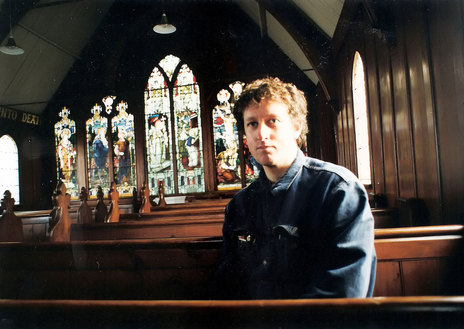
[David says he was unhappy with their way the American label handled Modern Rock, that there was no promotion to speak of, etc].
David – We thought we’ll give him one more chance, but it’s turned out quite well, because he’s too busy to release it, so Flying Nun America can have it.
Gary – You’ve been waiting around for this album to come out?
David – Not really. I’ve been waiting around to sort out the next solo album really, the Clean one was done in March, and I’ve been sitting out winter writing and recording on the four-track at home.
Gary – Is the environment in Auckland as inspiring in terms of writing?
David – Perhaps not. Probably not that different. The main difference would be that because we’re living in a flat I can’t make too much noise. I haven’t got a piano and a few little things like that. But no, not too different.
Gary – I was wondering in terms of where you get your inspiration from.
David – I really miss the environment, but I’m not sure how that effects my mental state or writing. I try and write every day or every week wherever I’m going to be. The first few months here was difficult, because I don’t feel at home. I don’t feel at home anywhere in the North Island really. I do have a real connection with the South Island. Part of that is the fact that I’m used to it, I’m comfortable with it. It’s a general vibe I have about the South Island, it’s one of the reasons we’ll probably go back, because we do miss it. In some ways they’re like two different countries, the air, the bush, the weather patterns.
Gary – When is the album coming out overseas?
David – I’m not sure when it will be released in Europe and America, I think next year. I think Flying Nun is just kicking off at the moment in America with the Chills the first release. I’m not sure what my brother’s been up to, he’s been out of New York for the last three months, and I’ve been out of touch with him, so we can’t do too much until we talk to him. He’s having a long camping holiday in Europe. Hopefully he might make it back this summer, and we’ll do some gigs and start writing the next LP, and formulate what we’re going to do. If we go to America we’ll just go for a month.
“We didn’t like the people who were running the industry, it was a bit spooky for us. What was the question?”
Gary – The Clean are incredibly hip in America.
David – I hope so. I know on the East Coast we have a definite following. There are certain pockets of interest. Modern Rock was received really well in New York. We hardly promoted Modern Rock at all. Hamish came back a few months after it was released here and we did some gigs, but the problems we’ve been having, obviously because Hamish lives there. It’s nice the interest is still there.
Gary – Do you get much feedback from American fans?
David – Hamish did obviously in New York. I get the very odd fan letter.
Gary – There have been quite a flow of Americans making a pilgrimage.
David – There’s a continual flow of them going through Dunedin.
Gary – And the Clean must be central to that.
David – For some of them it is. Others come from that Expressway side of things, and some for the Chills.
 Gary – Can the Yanks understand it? Are they getting the right thing from it?
Gary – Can the Yanks understand it? Are they getting the right thing from it?
David – I’ve spoken to a few people about it. A few people have said it’s the beat, some sort of beat, or swing to the rhythm, that makes it unique. Some of those acts in the Flying Nun and Expressway scene – nothing too slick or produced – the ones that make it over seem to like to link up to that. It’s also very cool at the moment with the whole lo-fi thing, so people have gone back and checked out what was happening at Flying Nun before. But whether they get the same thing out of it that we do…
Gary – Does the Clean feel like a band or a collaboration?
David – It’s both. It’s a band that we can slip into whenever we want whenever we want, but it’s also more of a creative project for us now. We’d like to be able to tour when a new record comes out. It’s both, but it’s a part-time thing. If we had more success in America, we’d like to speed it up a bit.
Gary – If someone had said 15 years ago that they wanted to release the record in the US and tour you, what would your reaction have been?
David – How do you mean?
Gary – Well, the Clean split up because they didn’t want to get involved in the inevitable industry shenanigans that come with success, didn’t they?
David – It was a little part of it, the treadmill. If we had been offered it, we would have jumped at it, sure. It was like a pipe-dream at the time. I think still the way of thinking was that if we were going to get anywhere it would be England, which is kind of funny looking at it now. It would be the worst possible place to go. I think we would have jumped at the chance, just for the experience perhaps.
Gary – So it wasn’t overseas success equals interference from the industry equals dissipation of what you were doing?
David – It would have been interesting if we’d had overseas interest. Up to the end we were still turning down offers from large venues, particularly here in Auckland. We wouldn’t do it mainly because it was an industry person… in some ways we were pretty staunch about our ideals, in some ways we were naive.
Gary – Have you sold out?
David – Good question! Chris Knox has stuck to the 4-track and the home machine. In that respect, at the time our big mission in life was ‘no, you don’t need a light-show, you can record in a 4-track’. But that was only because we had control of it, because we didn’t like the people who were running the industry, it was a bit spooky for us. What was the question? Someone was asking a similar thing the other day: ‘You’re in big studios now and you’re signing publishing agreements’, but that network wasn’t there for us in the early ’80s. The people that we’re recording with are generally our friends now, and the people in the industry are our friends and they’re running it, taking care of things. Friends was also a big issue for us… we had to deal with people we liked. When it comes down to the music, I can’t play with anyone I don’t know and like.
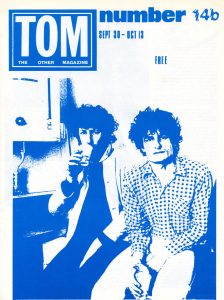
Gary – You couldn’t collaborate with someone you admired for their music but didn’t like?
David – Well sure, I’d have to get on with them. I don’t think you can really create with somebody you don’t feel comfortable with. Well you can, but it wouldn’t be that enjoyable.
Gary – I can’t imagine anyone who collaborated with Miles Davis ever enjoyed the experience from a personal point of view.
David – But I think they all come away knowing they learned a hell of a lot about music and how to play it.
Gary – Your albums sound really nice and they’re so beautifully crafted. Is there a different aesthetic at work between your solo stuff and The Clean?
David – Sure, there’s a total three-way collaboration with the Clean, and it’s still spontaneous. We write and record quickly. On Modern Rock you notice it more, you can see Hamish’s input, you can see mine, you can see Bob’s, if you look at what we’ve been doing solo-wise. With the two solo albums I’ve tried to make pretty nice sounding LPs because I wanted to try something different. I wanted to produce them a little more than I’d been doing.
Gary – The Clean still seem to be holding onto that DIY aesthetic – make it sound as cheap as possible – in an age where it’s possible to record albums on a small budget that sound like a million dollars. Why is that?
David – On this new album there are to me some pretty slick sounding things, but generally it is pretty… it’s still garagey for sure. The only difference is that it’s been recorded more naturally. We’re laying some of that stuff down pretty much as it’s been written, it’s pretty loose some of it. We’re still sticking to that ‘first idea, best idea, second or third take’. Hamish and I both have a very short attention span with music if it’s not fresh and enjoyable it’s time to stop doing it, so we try to get it down quickly. It’s a good and bad thing.
Gary – So with the Celan if you had a mission statement…
David – Keep it fresh, warts and all. We’re not trying to put the warts in there, we’re not trying to record it roughly. We’re just trying to keep it fresh and fun for us. If you talk to the engineers they’d say it was hard work. This LP we were trying to write as we recorded, and we were yelling at the engineer ‘I’ve got an idea, turn the tape recorder on!’ The poor guy would be freaking.
Gary – There are those amateur touches along with things that sound really beautiful. Was it the intention to get that sort of contrast?
David – No, because it was done quickly, we didn’t know where it was taking us. We were trying to treat every song individually, and it was taking us down these little tracks. But it did take a long time to finish this record, and it took quite a while to pull it all together, because Hamish left quickly when we finished it, when we first started it last year.
Gary – Two sessions, wasn’t it?
David – Robert and I tried through last winter to finish it by sending Hamish tapes. We got a little bit of work done by doing that, but we had to give that up because it was really frustrating. We were trying to write lyrics and melodies by tape and via the phone, but we gave up. So we finished it last March with Hamish when he was back.
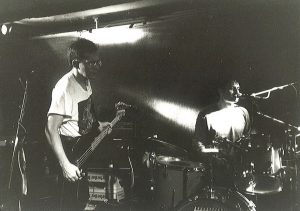
Gary – Is it an equal three-way thing?
David – Depends on the song and the mood. Pretty much, yeah. There are certain days or weeks when someone’s more creative, or has more energy. If someone starts flagging, the other one will pick up and help out.
Gary – Whose idea was ‘Balkans’?
David – That was a piano riff of mine we started playing on. Both songs are the same take but different production.
Gary – Why was it called ‘Balkans’?
David – I think because it kind of sounded Mediterranean. And because it was in the news at the time. There are lots of loopy names on the record, actually. Usually we have pretty silly working titles for songs, and this time we just let them all stick.
Gary – There’s a Crowtheremin…
David – Chris Knox had Paul Crowther make his version of the Theremin. It’s not the traditional Theremin. It’s just a box you put your fingers on. It’s like a very basic Moog. It’s very bizarre. I don’t know if it added too much to the record. It generally ended up sounding like whale noises, really.
Gary – Is that one of the things that interests you? Tinkering about with bizarre instruments?
David – yeah. We’re definitely interested in finding new textures and sounds. I think we were quite lucky this time we had Alan Starrad in Dunedin who has a lot of instruments at his house, and then finishing up here in Auckland getting the Mellotron and the Theremin. Always trying to find a new toy to play with.
“Hamish and I both have a very short attention span with music if it’s not fresh and enjoyable it’s time to stop doing it, so we try to get it down quickly.”
Gary – When you think about where the Clean fit into the music universe, does it hark back more to the rock roots, or is it more of a modern experimental rock?
David – I have to go back to something Hamish said in the early ’80s, which is that there’s a lot of unfinished work, even right up to now, within the pop field and the rock field. It’s still a broad spectrum. A lot of it has been done, and a lot of it is the same chords, but there are still a lot of different things you can do. With this album we’ve done more experimentation than ever, try to push what we can get away with. It’s risky, but… there was unfinished work in the ’60s that wasn’t carried on with in the ’70s, but I think now it’s more the modern thing. To try to push the envelope a little is a lot of fun. With this LP we tried some pretty risky things. We had to work on them to pull them all together. But now I’ve got some distance from it I think it holds together, but I must say we were worried about certain pieces. We didn’t use everything as well, we did leave a few things off.

Gary – So many of the current rock bands feel really recycled in a way that the Clean didn’t.
David – A lot of those new American bands seem to be influenced by ’70s hard rock. Things like Black Sabbath, Rush, Led Zeppelin. I can understand it totally. Most of them were teenagers during the ’70s. It’s funny alright.
Gary – Obviously you’re not influenced by that sort of stuff.
David – A little bit. Hard rock probably not. A little bit of Led Zeppelin, but only their quieter side. I was still finding out about the ’60s before punk came along, a little bit of Dylan, checking out the Stones. I shied away from people like Bowie, and Led Zeppelin never came into the house. I was given Black Sabbath’s Paranoid when I was about 10, but I never got into it. I didn’t like that.
Gary – Do you get into any of those hip lo-fi bands?
David – I bought that Guided By Voices box set, which has been really hard to get through. I really enjoy some of their stuff. I enjoy Pavement, Lou Barlow’s home recordings, from Sebadosh. I get into some of them.
Gary – Have you heard Tortoise and Ui?
David – No, there are so many of them. They’re not lo-fi but certainly not mainstream, a band called Lambchop. It’s hard to keep up with it all.
Gary – So much comedy rock on Max.
David – Midget rock for kiddies.
Gary – So what of the solo stuff. The two albums have done quite well?
David – No, not really. Neither of them got released in America. They got good reviews. Did very averagely in New Zealand, but got good reviews. I’m realistic about it. Some bands don’t have real success until their seventh album. When I first started I had pretty high hopes, but I’ve chilled out, the whole ambitious side of it as well, it’s not such a big deal anymore. But it also helps having the Clean as well, because it’s a different creative outlet. It brings you down to earth. You can get wrapped up in it all.
“Keep it fresh, warts and all. We’re not trying to put the warts in there, we’re not trying to record it roughly.”
Gary – Do you know which direction you’re going in with the next one?
David – I think I’m going to do it here at Airforce studio. Something a bit funkier than the last two LPs, maybe something a bit weirder, a bit looser. I never really know until I’m finished. I hope it’s gonna be different. Cars and Sugar Mouth were attempts at being accessible pop LPs that I could sit at home and enjoy. There will be a little less of that. The songs are still melodic-based and are still David Kilgour but the approach is going to be slightly different, less rock oriented. On both LPs it’s pretty much drum-approached. I wanted a third of Cars to be acoustic-based, not this ‘okay, we go and lay down the drum tracks and go ‘do-do-do-do-do-do.’ [He laid down drum tracks just in case he wanted to use them, but they ended up dictating the music or changing the character of the music.]
Gary – Cars was such a neat album to listen to at home.
David – Yeah, I really like it, it’s still my favourite. I’d like to remaster it. It’s a bit fluffy, a bit wobbly on the bottom end. But I’m still really fond of that record.
Gary – What would you do if Youth or one of those producers said ‘how about getting this drum’n’bass DJ guy in and we’ll do a collaboration and do a jungle/trip hop David Kilgour crossover album and we’ll pay the money to do it’? Would that be a complete culture clash? Irreconcilable differences?
David – Oh-eww. It depends on the person, really, and depends on the money. It has crossed my mind many a time, doing my synthesiser LP or whatever. I think everyone has their price. I really don’t know. I keep my options open, I’m willing to try anything. If I ended up doing something like that it would probably be with Nick Roughan, because he loves that sort of… no he doesn’t like jungle. No, I’m NOT doing a jungle LP! But for a million bucks in the bank account, tomorrow you can still do it! I have no qualms about making loads of money. I don’t mind selling out, as long as the price is right.
Gary – It just occurred to me that you have those grey areas in most genres, including jungle and there’s starting to be a little more collaboration between real time musicians and producer/DJ people.
David – I have talked about it with Nick Roughan. He obviously comes from his Skeptics thing. Another thing we’ve talked about for a long time is we hope to write music together and do weird stuff, even soundtracks. But if I do it it’ll be with him, but it won’t be under my name obviously. I know what you mean, the grey area, people are doing some interesting things, here and there.
“I shied away from people like Bowie, and Led Zeppelin never came into the house. I was given Black Sabbath’s Paranoid when I was about 10. I didn’t like that.”
Gary – Are you a Skeptics fan?
David – At the time no. I liked them live. Saw them in ’81 or something. I didn’t connect with them until just before David died really. I have a great video of them at the Gluepot. It took me a long time for me to get my head around it. Way ahead of their time for New Zealand, and in some ways The Gordons were too. They were thwarted by Flying Nun not releasing their records quickly enough, and Nick kind of slowed their momentum down quite a bit as well. They ended up running Writhe studios and they had to pay those bills and make that work too. Nick was saying the guy who played the bad guy in The Terminator, you know that evil skinny guy? They asked him when he was making the movie ‘what are you listening to at the moment?’ and he said ‘I’m listening to this really weird band called The Skeptics from New Zealand’. While he was driving to work each day. That was pretty apt.
Notes: I did this interview with David up at the Queen St offices of Flying Nun. He was friendly but a little detached. I tried to connect but honestly, I was into experimental electronic music at the time and guitar music was far from my mind. Still, some of David’s observations are meaningful and funny, and I love that story about the Skeptics-loving Terminator guy! What’s not mentioned in the interview was that I was there to talk about the Clean’s then-new album, Unknown Country.











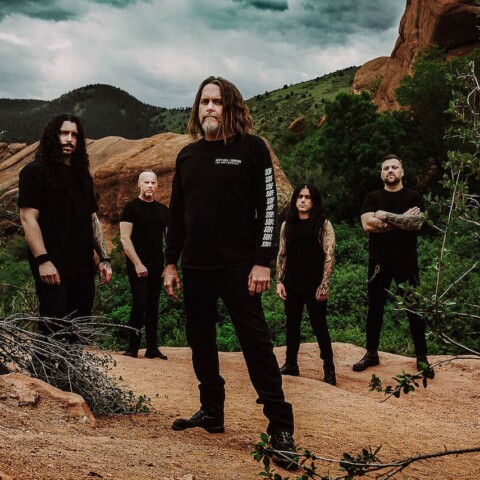


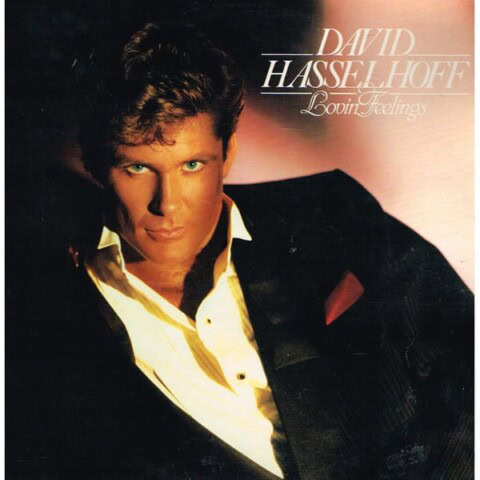

Sebadosh,
I don’t mind selling out, as long as the price is right.